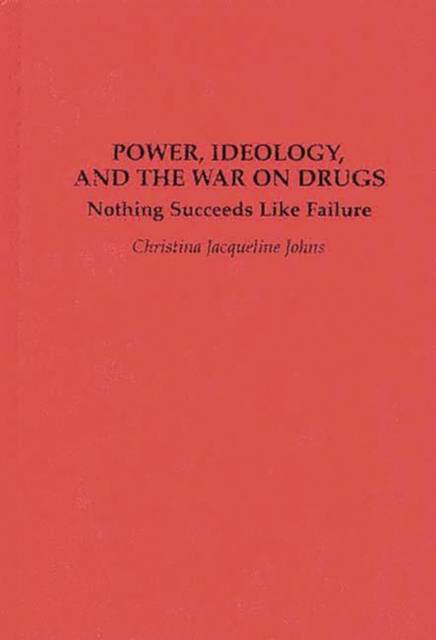
- Afhalen na 1 uur in een winkel met voorraad
- Gratis thuislevering in België vanaf € 30
- Ruim aanbod met 7 miljoen producten
- Afhalen na 1 uur in een winkel met voorraad
- Gratis thuislevering in België vanaf € 30
- Ruim aanbod met 7 miljoen producten
Omschrijving
Given the apparent failure of the War on Drugs to eliminate or even substantially decrease the use, sale, and trafficking of drugs, and given the negative social consequences of a Prohibition-like enforcement strategy, scholars and policy makers have often wondered why the administration continues to follow its policy of criminalization and enforcement. In Power, Ideology, and the War on Drugs, criminologist Christina Jacqueline Johns demonstrates that while the War on Drugs has been a failure in some respects, it has been highly successful in others. The War on Drugs has, for example, --diverted attention from severe social problems in the United States; --made drugs appear to be a cause of social ills rather than a symptom of social failures; --helped to legitimate a virtual abandonment of the lower class; --diverted attention from dangerous legal drugs which have been culturally and economically integrated into the society; --masked the fact that even the well-off are so alienated that they rely on illegal or legal drugs for support; --legitimated a vast expansion of U.S. state power and a consequent erosion of civil liberties and constitutional guarantees; and --legitimated further projections of state power into the internal affairs of Latin America.
Because there has been an almost unquestioning acceptance of drug war policy, the literature on the subject frequently fails to focus adequately on the ineffectiveness of the policy to accomplish its stated goal, the heightened social costs brought about by a war strategy, the socioeconomic context of drug use and drug trafficking, and the wider political implications of the policy. Johns discusses these issues at length, as well as the spurious argument that drug trafficking is a threat to democracy in Latin America. Research for Power, Ideology, and the War on Drugs is based on information collected from domestic and Latin American publications, government reports, current social science research, and the findings of the Latin American Critical Criminology group. This important new look at the War on Drugs will interest policy makers, scholars, and students in criminology, sociology, political science, and Latin American studies.Specificaties
Betrokkenen
- Auteur(s):
- Uitgeverij:
Inhoud
- Aantal bladzijden:
- 224
- Taal:
- Engels
- Reeks:
Eigenschappen
- Productcode (EAN):
- 9780275941673
- Verschijningsdatum:
- 20/04/1992
- Uitvoering:
- Hardcover
- Formaat:
- Genaaid
- Afmetingen:
- 156 mm x 234 mm
- Gewicht:
- 489 g

Alleen bij Standaard Boekhandel
Beoordelingen
We publiceren alleen reviews die voldoen aan de voorwaarden voor reviews. Bekijk onze voorwaarden voor reviews.











